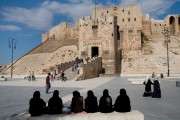 Thursday, 11 April, 2013 , 00:00
Thursday, 11 April, 2013 , 00:00Nytimes.com | Opinion | By KANAN MAKIYA | Published: April 6, 2013
ON April 9, 2003, Baghdad fell to an American-led coalition. The removal of Saddam Hussein and the toppling of a whole succession of other Arab dictators in 2011 were closely connected — a fact that has been overlooked largely because of the hostility that the Iraq war engendered.
 Thursday, 27 December, 2012 , 15:48
Thursday, 27 December, 2012 , 15:48Time.com | By Jay Newton-Small / Dohuk, Iraq
 Friday, 21 December, 2012 , 15:51
Friday, 21 December, 2012 , 15:51Time.com
If there is one man who deserves the credit for the growing Turkish-Kurd rapprochement, it’s Prime Minister Nechirvan Barzani of Iraqi Kurdistan. Five years ago Kurds and foreigners alike laughed in his face when he told them that not only did he want Iraqi Kurdistan to export its own oil, but that he wanted to export it to Turkey, which has had an intractable problem with its own large Kurdish minority. Barzani’s strategy was one of patience: starting with confidence-building with the Turks and then coaxing small oil companies and then larger ones to risk Baghdad’s ire to drill for oil not only in the autonomous region but in territory disputed by both Barzani’s government and the Iraqi central government.
 Friday, 8 June, 2012 , 12:05
Friday, 8 June, 2012 , 12:05Economist.com
The political aftershocks of a killing of Kurds still reverberate
TURKEY’S treatment of the Kurds has a grim new symbol. On December 28th Turkish warplanes bombed Kurdish smugglers crossing into Turkey from Iraq, killing 34. Most were teenagers; the youngest was 12. All came from a pair of villages in the mainly Kurdish township of Uludere. Their families had trouble separating the remains from mules who died. “We pieced them together the best we could and buried them,” says Abdurrahman Yurek, who lost his 16-year-old son.
 Monday, 21 May, 2012 , 14:46
Monday, 21 May, 2012 , 14:46nybooks.com | Charles Glass
Archaeologists believe that human beings settled on the hilltop that became Aleppo—some 225 miles north of Damascus—around eight thousand years ago. Cuneiform tablets from the third millennium BC record the construction of a temple to a chariot-riding storm god, usually called Hadad; while mid-second-millennium Hittite archives point to the settlement’s growing political and economic power. Its Arabic name, Haleb, is said to derive from Haleb Ibrahim, Milk of Abraham, for the sheep’s milk the biblical patriarch offered to travelers in Aleppo’s environs.
 Tuesday, 1 May, 2012 , 13:40
Tuesday, 1 May, 2012 , 13:40Interview by HAWAR ABDULRAZZAQ
In this interview with Rudaw, former U.S diplomat and adviser to the Kurdistan Regional Government Peter Galbraith says the time is ripe for Kurdish independence thanks to the thriving oil industry, international investment and the fact that Kurds are America’s only reliable ally in the volatile region. Galbraith says Iraqi Prime Minister Nuri al-Maliki is not following the constitution or respecting the rights of Kurdistan.


